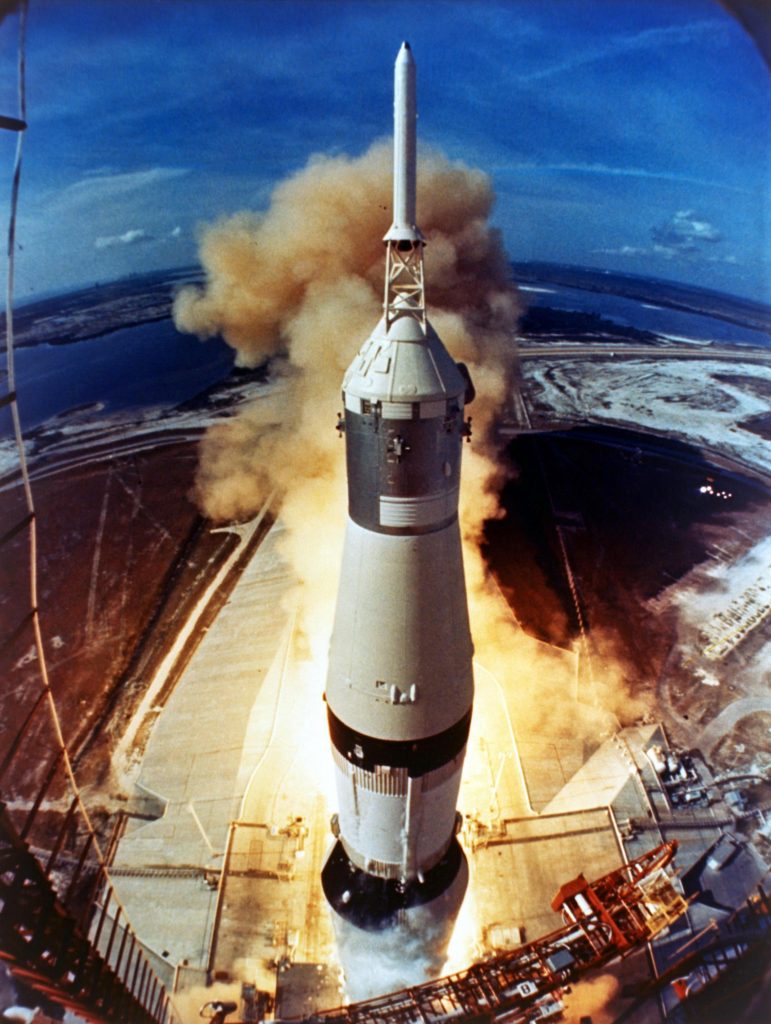Last month rekindled a lot of childhood memories for me with the 50th anniversary of the first of the Apollo moon landings on July 20th 1969.
As a seven year old, the whole Apollo programme fascinated me and inspired me to pursue a career in engineering. Fortunately I was able to do some early work in the space sector at the beginning of my career. Dabbling with exotic rocket fuels and exploring what they could do was great fun and we had some exciting moments too. However I never did realise the ambition of a bespectacled seven year old to be an Astronaut.
 During July the main TV channels showed some excellent documentaries about the topic. It was great to see one of my childhood idols James Burke back on the TV.
During July the main TV channels showed some excellent documentaries about the topic. It was great to see one of my childhood idols James Burke back on the TV.
So often the focus has been on the brave astronauts who flew the missions but without the support of “tough and competent” engineers working under extreme stress the missions would never have happened.
However a couple of programmes really stood out for me. The BBC World Service Podcast series “13 minutes to the moon” was truly extraordinary. Giving previously unheard insights into the story of Apollo and those that made it happen. The development of the Lunar Module (LM) by aircraft manufacturer Grumman stands out- a tough assignment after designing the F14 Tomcat of “Top Gun” fame! The young engineer sent to add thermal protection to the LM when it was in situ on the top of a fully fuelled Saturn V on the launch pad is a real eye opener.
Also the innovation of MIT building the mission computer for the LM is an incredible story. It was the first computer that was truly portable at a time when people boasted how big the buildings were that hosted their computer!
The Netflix documentary Mission Control- The unsung heroes of Apollo puts faces to the engineers who made the whole thing happen. It cover not only the moon landing of Apollo 11 but also the recovery from the tragedy of Apollo 1 and also the audacity of the Apollo 8’s journey around the moon, the well known mission to save the crew of Apollo 13 and the flick of the switch that saved Apollo 12 from aborting the mission shortly after lift off when a lightning strike disabled all of the screens at Mission control and caused chaos in the command module.
A good holiday read to get behind the story of the whole programme is Gene Kranz’s memoir “Failure is not an option” and yes- he’s the Ed Harris character in Apollo 13.
It was great to see on the Netflix documentary that two of the modern day Flight Directors at Mission Control Houston fulfilling the Gene Kranz role looking after the International Space Station are female.
I suppose for many of us there was a disappointment that the world of manned exploration ended after Apollo. Unmanned missions around the solar system have been incredibly successful and the rise of private sector projects such as SpaceX have created a new more economic source of heavy lift capability.
We may soon see visits to the Moon and Mars which will hopefully inspire a new generation of engineers.
For those who are interested in how the Soviets managed to get overtaken and lose the race to the moon they were so far ahead, an alternative story can be found in the biography of the Soviet “Chief Designer” Sergei Korolev. Someone who was so important his name was kept secret until after his sadly premature death.
In my opinion he is a true giant in the world of engineering.



Recent Comments